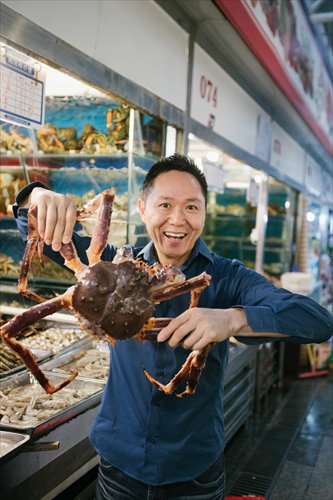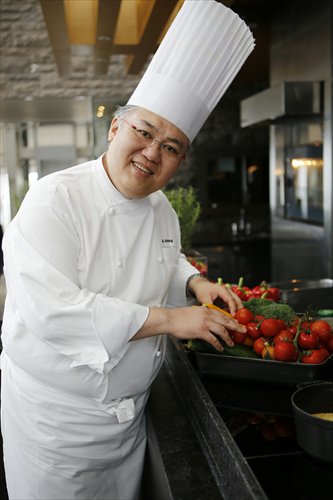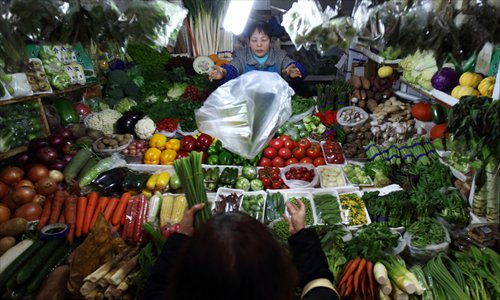Fresh food fairs
Modernizing Beijing’s produce markets

Ku Chi-fai, executive Chinese chef at The Ritz-Carlton Beijing, poses with fresh seafood at the Sanyuanli Market. Photo: Li Hao/GT
Hong Konger Ku Chi-fai is quite familiar with the little tricks played by the vendors at food produce markets in Beijing.
After choosing his vegetables, Ku usually asks the vendors to store them temporarily at their stalls while he goes on to shop for other things. "There were times when upon returning home, that I discovered the vegetables in the bag were not the ones I had chosen."
But Ku, the executive Chinese at The Ritz-Carlton, Beijing, in Chaoyang district, loves to explore different local markets in Beijing, despite some of them being quite shabby, disorganized and unhygienic. For him, wandering among the vendors of the diverse range of fresh vegetables, fruit, ingredients, meat and seafood, is a way of connecting with and understanding local life and culture.
Food produce markets give texture to a city. In recent years, Beijing has witnessed the shutdown of several fresh produce markets, in the wake of the capital's urban regeneration projects. Meanwhile, brand new, modernized markets are springing up to better satisfy residents' daily needs.
So what kind of food market does China's capital need amid its rising skyscrapers?

Jack Aw Yong ready to cook in his hotel kitchen. Photo: Courtesy of Park Hyatt Beijing
Market shutdown
August 31 marked the last day of the Tiantaoguangda Market, an outdoor food and produce fair in Dashilar, Xicheng district. Local residents in the neighborhood especially went to the fair that day to do their last shopping and to bid farewell to the 12-year-old market.
Tiantaoguangda was not the only one destined for closure recently. In May, Zhonglou Market in Dongcheng district and Gongmenkou Market in Xicheng district were shut down to make space for city construction.
"The traditional, old markets are often connected with unpleasant feelings of being smelly, crowded, and are considered to be the cause of traffic jams and pollution, and a place for large numbers of migrants to gather," an anonymous urban planner from the Beijing Municipal Commission of Urban Planning, explained to the Beijing Daily in May. "They became increasingly unacceptable in the core parts of downtown Beijing where land prices are skyrocketing."

Fresh vegetables at a Beijing market. Photo: CFP
A wide variety
For the expat community, Sanyuanli Market in Chaoyang district, known for its close proximity to the embassy area and the variety of imported ingredients available, is the favorite local food fair.
In 2013, Sanyuanli Market was renovated. Ku, who started visiting the market in 2009, has found that the shopping environment has become more pleasant.
Ku, who specializes in Cantonese cuisine, likes the market because one can find almost anything you need from there, from special local products and ingredients from the different regions in China, to exotic seasonings imported from overseas. "The other day I wanted some original babao tea, but our hotel suppliers failed to provide. I finally found it at Sanyuanli."
Responsible for providing tasty and quality delicacies at the hotel, Ku spends a lot of time exploring local fairs with hotel food suppliers. At Xinfadi Market, Beijing's largest vegetable wholesale market in Fengtai district, Ku was disappointed in the poor quality of the vegetables. On the other hand, when he visited Jingshen Seafood Market in the same district, he was impressed by the great diversity of products.
"Local fairs give me culinary inspiration," said Ku. "Visiting markets gives you a different experience to supermarkets. You can always learn more about the produce and ingredients."
He is creative in mixing Cantonese cuisine with northern flavors. When he discovered xiangchun leaf, a kind of vegetable often fried with eggs, he used the leaf in Cantonese cuisine, cooking them with sea cucumber and fish.
Improving the market design
The Sanyuanli Market is now cleaner and neater than many other local food markets, but for Ku, it still lacks distinct separation in grouping products.
"For example, in Beijing markets, all products are presented in an alley, whereas in Hong Kong, each storey of the market sells a particular type of produce."
Singaporean Jack Aw Yong, executive chef of the Park Hyatt Beijing, said his family's favorite market is Sanyuanli, too. His impression is that vendors at the Xinfadi are quite impolite, while the display counters and the surroundings of the seafood at Jingshen are grimy and unhygienic.
"Beijing should strive to develop their markets to meet international standards while still maintaining its authentic flavors and cultures," he said.
One of the most important factors for improving the market shopping experience, according to him, is to control the odors in the market. He cited a Hong Kong market as an example. "When you take the escalator to the restaurant which is on the third floor, you can smell the odor of the market below. But as soon as you get off the escalator and enter the restaurant, the odor vanishes."
In Singapore, food and fresh produce markets used to be quite dirty and smelly, especially the areas vendors use to slaughter chickens and ducks. After years of redesign and reconstruction, including separating the indoor and outdoor function areas, the environment has greatly been changed.
"Singaporeans like eating at the hawkers' markets, because it's clean, and the food meets safety standards. The government imposes high standards to regulate the vendors," said Aw Yong.
Beijing markets should look to the markets in European countries where shoppers can buy plants and flowers outside the market and can go inside to eat fresh oysters or drink champagne, he said. Markets can be decent and elegant places as well. For example, at Japanese markets, vendors even wear suits.
"Imagine if a lady is happy to visit a market wearing a gracious outfit," said Aw Yong, "It will encourage more women to fall in love with cooking at home."
A brand-new fair
In late September, Beijingers will get to enjoy the brand-new Dongdan Market, which will see a rebirth in Heping Xijie in Dongcheng district. Originally built in 1902 near to the former legation quarter, it was demolished in 1997 to give way to the high-rise of the Oriental Plaza.
The new Dongdan Market is a seven-floor complex covering almost 10,000 square meters, serving more than 300,000 residents in 42 communities in the area. A delivery service via smart phone will also be provided, said Zhang Zhiqun, an officer from the Dongdan Market, according the Beijing Daily in August.
Fruit, vegetables, meat and seafood will be sold in the basement. The first floor will sell tobacco and wine as well as host the stalls of a number of China's traditional and time-honored brands. The third floor will be a fast food dining area while high-end restaurants will be situated on the fourth floor.
"The prices of the vegetables at the market will be 30 percent lower than other markets and supermarkets, as the vegetables are being sourced from Beijing, Tianjin and Hebei Province," said Zhang.
Aw Yong believes that it is not a good idea to relocate food markets from the downtown area to areas further away. "Food markets are an important part of a community. It's like a school, a hospital, a garden, which are essential to people's lives."
The best of Beijing's markets
Chongwenmen Market: locals' choice
The market is the first choice of Beijingers living in the south of the city. The market not only offers fresh fruit and meat but also satisfies visitors' taste buds with cooked food stalls.
Where: No. 41 Guangqumennei Dajie, Chaoyang district
Zhaolanyuan Market: on campus
Situated inside Tsinghua University, Zhaolanyuan is known for its fresh vegetables, especially those traditionally planted in southern China. In Spring, one can buy wild vegetables, including malantou, dandelion and Chinese wolfberries.
Where: Tsinghua University, Yuanmingyuan Lu, Haidian district
Laoshan Market: under the hill
The market is a pleasurable place to drop in and shop, especially after a morning workout in the Laoshan Park. The fair is huge, offering vegetables, flora, birds and fish.
Where: Fushi Lu, Shijingshan district
(Source: The Beijing Business Today)